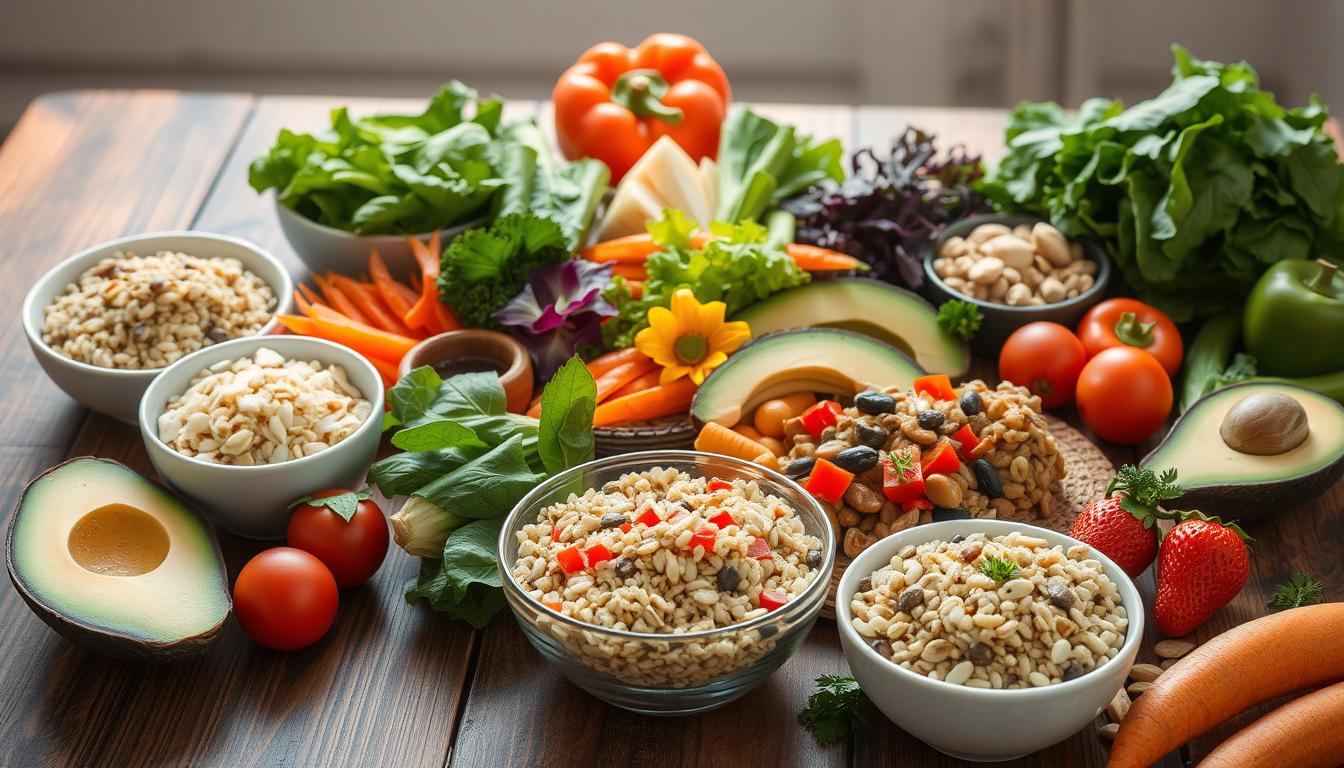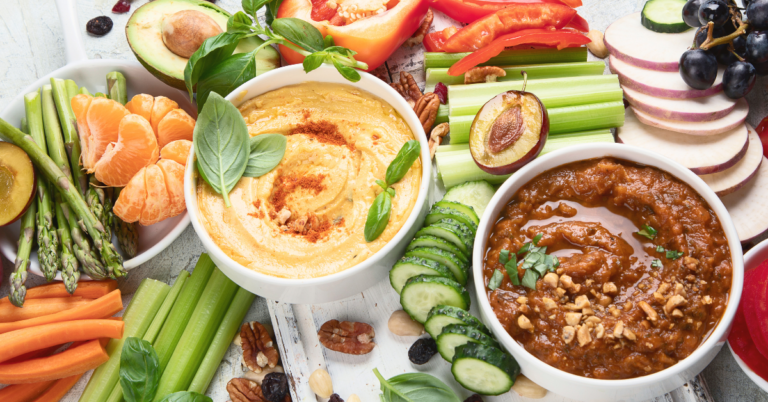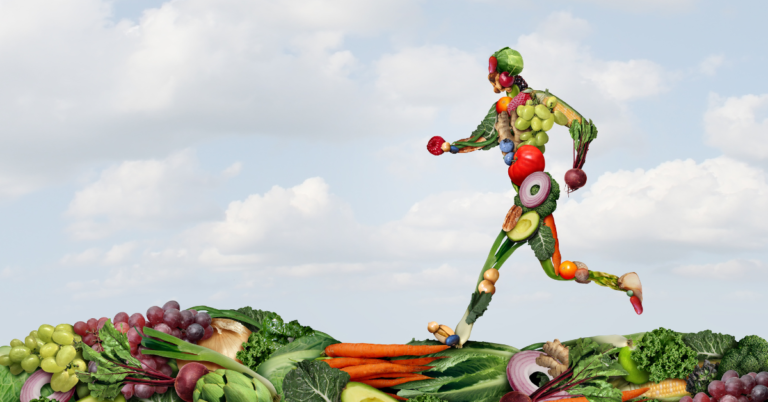A plant-based diet is more than a trend. It’s a lifestyle choice that focuses on whole foods like fruits, veggies, and grains. It also includes legumes, nuts, and seeds. By cutting down on animal products, you can eat healthier and help the planet.
This guide will show you how to start eating clean. You’ll learn about the health benefits and how it’s good for the environment. It’s a great way to feel better and live sustainably.
Studies show that a plant-based diet can help you lose weight and improve heart health. A 2020 review found that people on these diets lost weight. They also found that plant-based diets can lower heart disease risks and help with Type 2 diabetes better than other diets.
Switching to a plant-based diet can change your life for the better. You’ll eat healthier and save money. This guide will help you get started with delicious recipes and tips for eating clean.
Key Takeaways
- A plant-based diet prioritizes whole foods over processed ingredients.
- Significant health benefits include weight loss and reduced risk of chronic diseases.
- Research supports the emotional and physical advantages of adopting a plant-based lifestyle.
- Transitioning to this diet can lead to notable savings on grocery bills.
- Choosing a plant-based approach can promote environmental sustainability.
Understanding the Basics of a Plant-Based Diet
A plant-based diet focuses on eating whole, unprocessed foods and cutting down on animal products. It’s not about strict rules but a flexible way of eating that puts plants first. The main foods include:
- Vegetables
- Fruits
- Whole grains
- Legumes
- Nuts and seeds
Staying away from foods like added sugars and white flour makes the diet better. It’s also good to choose organic and local foods when you can. Eating this way helps you stay healthy and is kind to the planet.
About 25% of Americans are eating less meat now. Studies show that eating less meat might lead to more processed foods, which isn’t always good for you.
Studies also show that a plant-based diet can help prevent diseases like type 2 diabetes. It can even help you live longer by eating foods like beans and tofu.
Eating mostly plants can help with many health problems. It can lower your risk of heart disease and help manage diabetes. You might even lose weight because you’re eating fewer calories. Plus, you could save around $750 a year by choosing plants over meat.
To start a plant-based diet, try to make 66% of your meals plant-based. It’s key to plan your meals well to avoid missing out on important nutrients like vitamin B12 and iron. Looking for resources on plant-based diets can make the transition easier.
| Food Group | Focus | Benefits |
|---|---|---|
| Fruits | Opt for a wide variety | High in vitamins, antioxidants |
| Vegetables | Include dark leafy greens | Rich in fiber, low in calories |
| Whole Grains | Brown rice, quinoa, oats | Provide energy and dietary fiber |
| Legumes | Beans, lentils, chickpeas | Excellent protein sources |
| Nuts and Seeds | Almonds, chia, flax | Offer healthy fats and nutrients |
The Benefits of a Plant-Based Diet for Your Health
Switching to a plant-based diet brings many health benefits of plant based diet. It helps with disease prevention and weight management. People who follow this diet often see big improvements in their health.
Studies show that a plant-based diet can lower your BMI and improve your cholesterol levels. This is great news for your health.
In the US, obesity rates are high, at 39%. But vegetarians can lose about 1 pound a week, even without exercising. One person’s HbA1C went from 11.1% to 6.3% in just three months after switching to a plant-based diet.
This diet also lowers blood pressure and cholesterol. The same person’s total cholesterol dropped from 283 mg/dL to 138 mg/dL in 16 weeks. They also needed fewer medications to keep their blood pressure low.
Some key benefits of a plant-based diet include:
- Less risk of heart disease, stroke, and diabetes
- Lower rates of obesity and high blood pressure
- More nutrients like magnesium, potassium, iron, and vitamins
- Better calorie burning after meals compared to non-vegan diets
Vegetarians have fewer chronic diseases than meat-eaters. This shows how effective a plant-based diet is for health. It also helps you eat more nutrient-rich foods and less processed meats.
In short, a plant-based diet helps with weight and prevents diseases. It promotes healthier habits and better health overall.
| Health Benefit | Effect |
|---|---|
| Weight Management | Average loss of 1 pound per week |
| Cholesterol Reduction | From 283 mg/dL to 138 mg/dL |
| Blood Pressure | Maintained below 125/60 mmHg |
| Risk of Disease | Lower rates of heart disease, diabetes, and obesity |
How a Plant-Based Diet Compares to Vegan and Vegetarian Diets
A plant-based diet and vegan options have different effects on what people eat. Vegan diets don’t include any animal products, like meat, dairy, or eggs. On the other hand, plant-based diets mainly focus on plants but sometimes include animal products. This makes plant-based diets more flexible for those who don’t want to give up animal proteins completely.
Vegetarian diets are another option. They exclude meat, fish, and poultry but allow eggs and dairy. This makes it easier for people to start eating less meat than a vegan diet. All these diets stress the importance of eating more plants and getting balanced nutrition.
Studies show that vegan and vegetarian diets can lower heart disease risk. They often have lower blood pressure and cholesterol levels. Eating whole, unprocessed plant foods like fruits, vegetables, and grains is key. Experts suggest that half of your diet should be vegetables, a quarter whole grains, and a quarter lean proteins.
It’s important to think about nutrients in all diets. Vegans need to watch out for B12, found in animal products. For those avoiding dairy, getting enough calcium is crucial. Plant-based milks like almond milk can help. Pregnant women, babies, and young children need careful planning to get all the nutrients they need.
| Diet Type | Animal Product Exclusion | Nutrients of Concern |
|---|---|---|
| Vegan | All animal products | Vitamin B12, Calcium, Omega-3 fats |
| Vegetarian | Meat, poultry, fish, seafood | Vitamin B12, Iron, Zinc |
| Plant-Based | Mostly plant foods | Calcium, Protein sources |
Whether you choose a plant-based, vegan, or vegetarian diet, the Heart Foundation suggests eating a variety of plants for heart health. The best choice depends on your health goals and nutritional needs.
Food Groups to Embrace on a Plant-Based Diet
Starting a plant-based diet means exploring a world of nutritious foods. Each group adds variety to meals, boosts nutrients, and supports health goals. By focusing on different food groups, you can make your meals both tasty and healthy.
Key Plant-Based Food Categories
- Fruits: Add a splash of color with fruits like berries, apples, and bananas. They’re packed with vitamins, antioxidants, and sweetness.
- Vegetables: Make veggies the main event. Leafy greens and broccoli are rich in nutrients and fiber.
- Whole Grains: Quinoa, brown rice, and oats are key for energy and fiber. They’re good for your digestive health.
- Legumes: Beans, lentils, and chickpeas are great for plant protein. They help meet your daily protein needs without animal products.
- Nuts and Seeds: Mix in nuts and seeds like almonds, chia, and flaxseeds. They offer healthy fats and important nutrients for wellness.
These food groups are crucial for a balanced plant-based diet. They help ensure you get all the nutrients you need while being kind to the planet. By embracing these categories, you’ll enjoy a colorful, fulfilling, and nutritious diet.
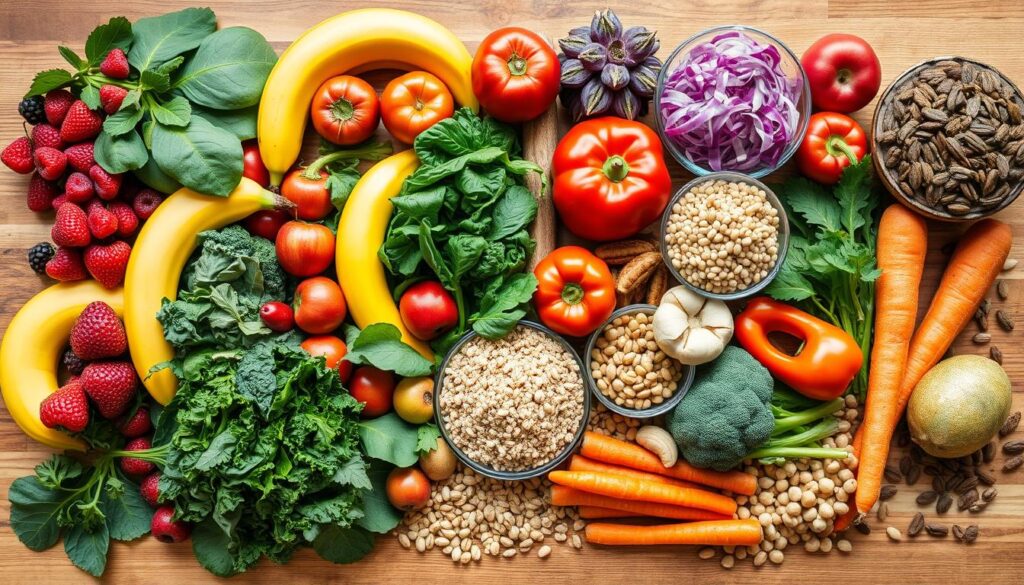
Essential Nutrients and Supplements for Plant-Based Nutrition
Plant-based nutrition offers many health benefits. It’s important to get all the necessary nutrients from whole foods. Some nutrients need extra attention, especially with supplements to prevent deficiencies.
Vitamin B12 is key for energy and brain health. Adults need 2.4 mcg daily, more for pregnant and breastfeeding women. Those on a strict plant-based diet might need 25–100 mcg daily or 2,000 mcg weekly.
Vitamin D is crucial for bone health. Adults need 600 IU daily, more for older adults and pregnant women. Not getting enough sun can lead to a need for supplements.
Omega-3 fatty acids are vital for heart and brain health. Algae-based supplements are a good source. Aim for 200–300 mg daily of long-chain omega-3s.
Iron is a concern for vegans. The RDA is 8 mg for men and 18 mg for women, 27 mg for pregnant women. Vegans should aim for 1.8 times the normal RDA, possibly with supplements.
Calcium is essential for bones. The RDA is 1,000 mg for most adults, 1,200 mg for those over 50. Many vegans might need fortified foods or supplements for calcium.
Getting Started: Transitioning to a Plant-Based Lifestyle
Starting a plant-based diet is a journey filled with new tastes and health benefits. You can begin slowly or all at once. Starting slow is often easier, especially if you’re used to eating meat and dairy.
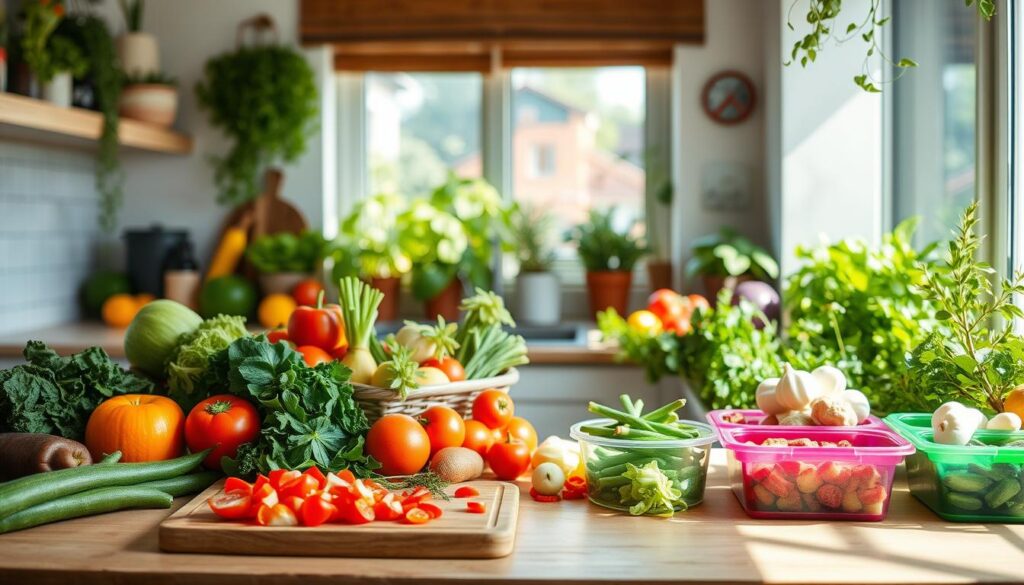
Begin by adding whole grains and legumes to your meals. These foods are packed with nutrients and can replace animal products. Instead of focusing on what you can’t eat, look forward to trying new plant-based foods. This positive approach makes the transition more enjoyable and helps you stick with it.
Try adding one or two new fruits or vegetables to your meals each week. This not only broadens your taste but also boosts your nutrition. Also, replace two animal-based foods with healthier plant-based ones. For example, use plant milks instead of dairy or tofu instead of meat.
Cooking at home is a great tip. It lets you choose the ingredients and avoid unhealthy additives found in restaurant food. Meal prep twice a week helps keep healthy options ready when you’re hungry. It also ensures you get enough protein, about 50 grams a day for adults.
Exploring global cuisines like Asian and Indian can make adapting to a plant-based diet more exciting. These cuisines offer a wealth of plant-based dishes, turning diet changes into a culinary adventure.
| Beginner Tips | Description |
|---|---|
| Start Gradually | Introduce plant-based options slowly to avoid feeling overwhelmed. |
| Add Variety | Incorporate one or two new fruits or vegetables each week for diversity. |
| Cook at Home | Prepare meals to control ingredients and reduce unhealthy additives. |
| Eliminate Animal Products | Swap out two animal-based options for plant-based alternatives each week. |
| Meal Prep | Plan meals in advance to simplify the cooking process and ensure nutrition. |
| Explore Cuisines | Try plant-based dishes from different cultures for inspiration and enjoyment. |
With these tips and a positive attitude, beginners can smoothly transition to a plant-based lifestyle.
Delicious Plant-Based Recipes for Beginners
Starting a plant-based diet is exciting, with many tasty options for beginners. These recipes are easy to make and fun to prepare. Try dishes like black bean-quinoa bowls, roasted veggie stir-fries, or hearty vegetable soups. They use simple ingredients to create big flavors with little effort.
The following table showcases a few beginner recipes that emphasize speed and nutrition:
| Recipe | Preparation Time | Key Ingredients |
|---|---|---|
| Chickpea Salad | 10 minutes | Chickpeas, cucumbers, tomatoes, lemon juice |
| Stir Fry with Tofu | 30 minutes | Tofu, bell peppers, broccoli, soy sauce |
| Pasta e Fagioli Soup | 20 minutes | Pasta, beans, seasonal vegetables, broth |
| Black Bean Salad | 15 minutes | Black beans, corn, bell peppers, cilantro |
Experimenting with familiar meals can help ease the transition to a plant-based lifestyle. For example, using lentils instead of ground meat in bolognese sauce is a tasty and protein-rich choice. These recipes are not only delicious but also loved by families, making everyone enjoy plant-based eating.
There are many resources to find more easy plant-based meals. Try using beans, legumes, and grains like quinoa and barley. These ingredients make meals satisfying and quick to prepare. The more you try, the more you’ll find your favorite dishes that keep your meals healthy and tasty.
Conclusion
Switching to a plant-based diet is more than just changing what you eat. It shows you care about your health and the planet. Research shows that eating plants can help you lose weight and lower your risk of serious diseases.
Studies show that people who eat meat often have more saturated fat and face more health risks. But, those who choose plant-based foods are healthier.
Starting a plant-based lifestyle doesn’t have to be hard. You can slowly add more whole foods like fruits, veggies, legumes, and nuts to your meals. Just remember to keep an eye on getting enough protein and vitamins.
Choosing a plant-based diet can greatly improve your health and help the environment. By focusing on healthy eating and exploring plant-based options, you’re making a positive impact on both your health and the planet.

